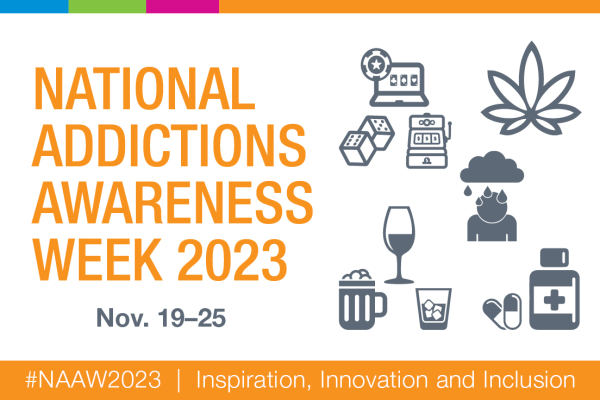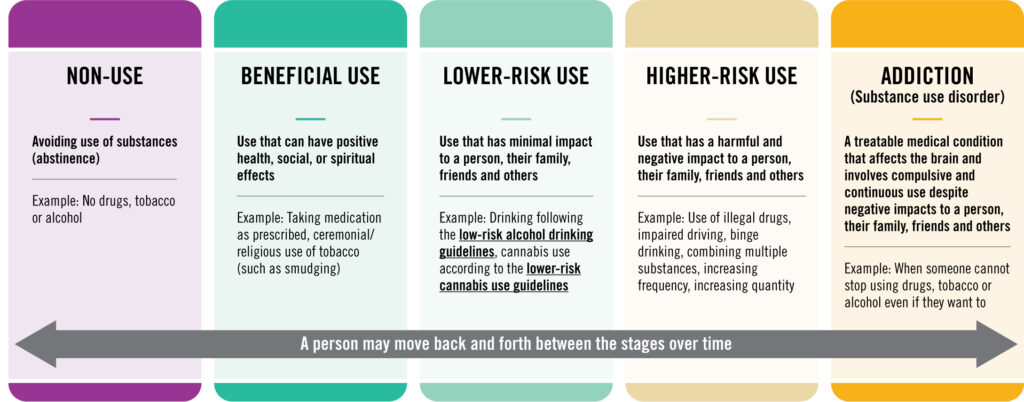It is National Addictions Awareness Week and this year the theme is Inspiration, Innovation, and Inclusion. Our goal for this week, along with every other week, is to raise awareness about substance use in our community. Substance use affects all walks of life with far reaching impacts for individuals, families and communities.
Shifting Our Views on Substance Use
For thousands of years, people have been using various psychoactive substances. Each person experiences substance use health differently. In fact, many people who use substances do so without experiencing serious health or social consequences. Our goal should not be to categorize or label a person’s substance use. Rather, we can support individuals in self-assessing their relationship with a given substance and allow them to identify their own goals for well-being. Sometimes it is helpful to view substance use as a spectrum.
Understanding Substance Use Disorder (SUD or ‘Addiction’)
We are still working towards our understanding of Substance Use Disorder (SUD). What we do know is that SUD is not a choice, lack of willpower, or a moral failing. It is a result of chemical changes to the brain that are related to a person’s motivation, cravings, and decision-making. When this occurs, it makes it challenging for a person to decide on their behaviour, despite their desire to stop or change their substance use. When a person continues to compulsively crave, seek, and use substances despite negative consequences, they can be diagnosed with SUD. For many people, substance use is connected to experiences of trauma in their life (Community Addictions Peer Support Association [CAPSA], 2023).
Stigma towards people who use drugs is unique. People who use substances are thought to have personal control over their disorder. They are often held responsible and blamed for their substance use. Stigma can show up in our thoughts, words, and actions and can look like stereotypes, labeling, discrimination, shaming, and judgement.
Our Language Matters
To work towards reducing stigma associated with substance use, our language matters. The words we use to describe a person can influence our attitudes, beliefs, and behaviours toward them, including the care decisions made by service providers.
When we are more aware and inclusive with our language choices, we can avoid using hurtful words or expressions that discriminate against particular groups or communities. Each of us has the power to influence positive change and role model more inclusive practices. The following are examples of how we can work to change our language.
| When We Say... | People Hear... | Instead try... |
|---|---|---|
| Addict, drug user, junkie, druggie, alcoholic, etc. | It's your fault and people only see you as an addict. You're not even a person in my eyes. There's no hope for you. | Person who uses substances |
| Clean/dirty needles | Suggests substance use has something to do with cleanliness and are not accurate medical terms. | New or sterile/used needles |
| Relapse/lapse | You're a failure and went back to bad habits. Shaming and discouraging from getting help. | Resumed using substances |
| Methadone maintenance or opioid replacement | You're just replacing one drug with another. This language does not support different treatment options. | Opioid Agonist Therapy |
| Substance abuse/misuse drug habit | What you're doing is wrong. You're making bad choices. This language suggests that people who use substances deserve punishment instead of support. | Substance use |
Learning and Growing Together
In the spirit of Inspiration, Innovation, and Inclusion, please join us on a shared learning journey. Throughout National Addictions Awareness Week, we will be sharing resources and highlighting key learnings about substance use health.
Educational Opportunities
Lived/Living Expertise Stories
- Tuesday November 21, 2023 from 6:00 pm to 8:00 pm at Youth Wellness Hubs Ontario (YWHO) located at 140 King St. W Chatham.
- Family members, children 12+, and partners are welcome to hear from loved ones about their personal journey as a family member of someone with a Substance Use Disorder. No registration required.
Xylazine Basics
- Wednesday November 22, 2023 from 5:00 pm to 8:00 pm at Studio One located at 75 William Street N, Chatham.
- Hosted by R.O.C.K. and the Peer-2-Peer Program, learn about Xylazine including the symptoms, approaches to care, and harm reduction strategies. Register for FREE here.
Community Expertise, Building Community Power and Making Change Happen: Peer-2-Peer Program
- Wednesday November 29, 2023 from 12:00 pm to 1:00 pm.
- Webinar hosted by the National Collaborating Centres on Determinants of Health. Register for FREE here.
Reducing Alcohol Harm in Ontario Municipalities: Policy Options and Overcoming Challenges
- Wednesday November 29, 2023 from 1:00 pm to 2:00 pm.
- Webinar hosted by the Ontario Public Health Association (OPHA) and the Canadian Alcohol Policy Evaluation (CAPE) Community of Practice. Register for FREE here.
Peer-Support Speakers Sharing Journeys Through Recovery
- Friday December 1, 2023 from 3:00 pm to 5:00 pm at Youth Wellness Hubs Ontario (YWHO) located at 140 King St. W Chatham.
- For youth ages 12 – 25 years old. No registration required.
Drug Strategy Network of Ontario
The Drug Strategy of Ontario (DSNO) aims to prevent and/or reduce the harms associated with alcohol and other drugs in Ontario, including addressing systemic issues like health and social policies and the criminalization of people who use substances.
Infographics on Policy Solutions to End the Overdose Crisis
- Understanding how the unregulated opioid supply impacts the drug poisoning crisis in Ontario
- Approvisionnement non reglemente en opioïdes comprendre ses effets sur la crise des intoxications
- Addressing the drug poisoning crisis in ontario
- Une nouvelle orientation pour faire face a la crise des intoxications par substances psychoactives en Ontario
Additional Resources
- You can find additional resources at the Canadian Centre on Substance Use and Addiction website.
References
Stuart,H. (2019). Managing the stigma of opioid use. Healthcare Management Forum. Vol. 32(2), 78-83. Community Addiction Peer Support Association (CAPSA). 2023. Understanding substance use health: A matter of equity. https://capsa.ca/about/resources/


